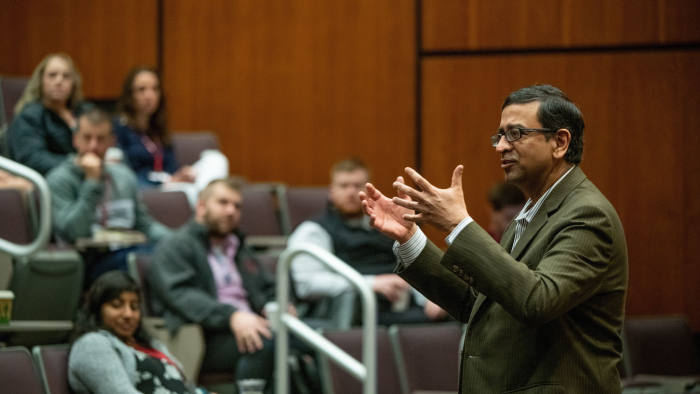Why an online MBA doesn’t mean forgoing real-life networks
For numerous managers eager to examine for an MBA, the prospect of encounter-to-encounter networking will make on-campus courses the most well-liked alternative. But the vacation clampdown caused by coronavirus, as properly as the closure of some campuses, may well force them to sample the alternate of on line mastering.
If they do, they will be reluctantly next in the footsteps of the numerous learners — and instructors — who extensive ago concluded that on line examine is the very best suit both of those for fast paced life and for consciences troubled by the environmental consequences of worldwide flights.
A person significant-degree change to on line mastering is Alison Fragale, a professor at the College of North Carolina’s Kenan-Flagler Small business University who teaches lessons in negotiation from her property in Chicago. On a typical early morning there she may be sharing her insights with UNC-enrolled learners throughout time zones ranging from dawn in California to night in Singapore.
Nevertheless she was originally uncertain about this method to company training, it is, she claims, one of the “most rewarding” issues she has carried out. “It forces you to choose a critical glimpse at your instructing, and recognise how complacent you can come to be in the encounter-to-encounter classroom,” she clarifies.
For learners drawn to an MBA in part by the chance to create daily life-extensive networks by classroom sessions, team get the job done and extreme socialising, the attraction of undertaking the program remotely may well seem to be limited. But a combination of technological developments, altering cultural behaviors and carefully crafted programmes are helping to make on line MBAs extra appealing.

Enhancements in electronic communications have performed a huge part. Prof Ramesh Venkataraman, chair of immediate MBA and MS programmes at Indiana University’s Kelley University of Small business, claims: “Seven years ago it was challenging to train on line for the reason that of poor bandwidth. The engineering intended you were being not capable to simulate what you can do in the classroom.”
He recollects the requirement of “asynchronous” instructing, where program individuals independently posted written feedback to dialogue boards and there was no interactivity. “Now it is pretty pure,” he claims. “I would argue there are issues we can do even far better than in a encounter-to-encounter classroom.”
Like his peers elsewhere, Prof Venkataraman works by using digital “breakout rooms”, where learners hold tiny team conversations in real time and make notes in Google files that can be tracked systematically and shared with many others. “You cannot do that pretty properly in a real class, where it is all speaking and you are not recording just about anything,” he claims.
He also argues that the use of written on line commentary can “even out the taking part in field” for shy learners: unlike a are living classroom dialogue, it lets them time to replicate and contribute, fairly than currently being drowned out by noisier individuals.
Meanwhile modern society has stored tempo with engineering. Prof Fragale argues that the present-day era of learners, as properly as professors of all ages, are more and more snug with electronic interaction. Quite a few routinely use collaboration tools these as Slack and Zoom at get the job done, as properly as Facebook and WhatsApp in their social lives.
Martin Boehm, dean of IE Small business University in Madrid (which is the FT’s companion in Headspring, an govt progress enterprise), claims that on line mastering can occasionally be “more personal” than the offline range. “I recall a participant who explained to his classmates ‘I let you all into my household, my property, you see my wife and my kids’,” he claims.
He contrasts some of his encounter-to-encounter total-time MBA learners, who are “self-funded, soul seeking, and typically really don’t know what they want to do”, with the bigger determination of their on line counterparts, who are typically doing work whilst researching. This real-world exposure can also enrich class conversations. “We really encourage them to carry worries from their get the job done into the class,” Prof Boehm claims.
Similarly, the pressures of balancing examine with get the job done and household daily life can be extreme. But Prof Boehm claims that fellow learners typically move in, share their possess ordeals and really encourage anyone who is struggling to stick with the program. Teaching staff members also supply support, with a ratio at IE of one college member to 35 learners on line — nearly twice the degree of the total-time classroom-dependent MBA.

Scholar engagement is also strengthened by the point that numerous on line vendors nevertheless insist on some “blended” mastering — that is, mastering that calls for the student’s actual physical existence. At Kenan-Flagler, that usually takes position in the course of “summit” gatherings on campus or in a metropolis overseas. And at IE, learners are predicted to expend two to a few months on campus, together with at the commence of their program.
“They fulfill appropriate at the commencing,” claims Prof Boehm. “They make very good use of their time — they get the job done, examine, occasion genuinely challenging. They really don’t snooze.” That delivers particular contacts which can then be nurtured remotely, in chat rooms, class conversations and team get the job done.
Prof Venkataraman acknowledges that there are nevertheless restrictions to on line mastering. “Some extreme debates are challenging to simulate — the softer features of encounter-to-encounter interaction with eye speak to,” he claims. “We may well nevertheless need to have far better engineering. But we are way past expressing that on line is inferior.”
